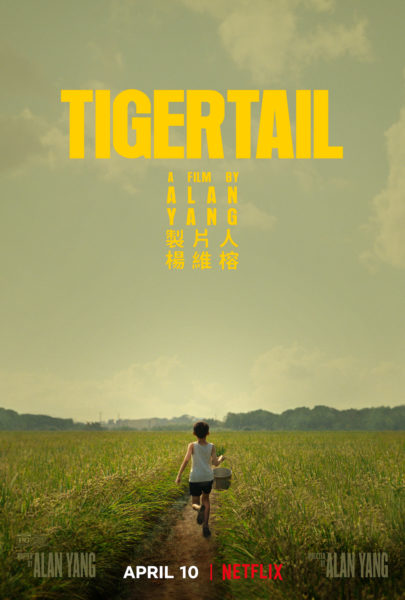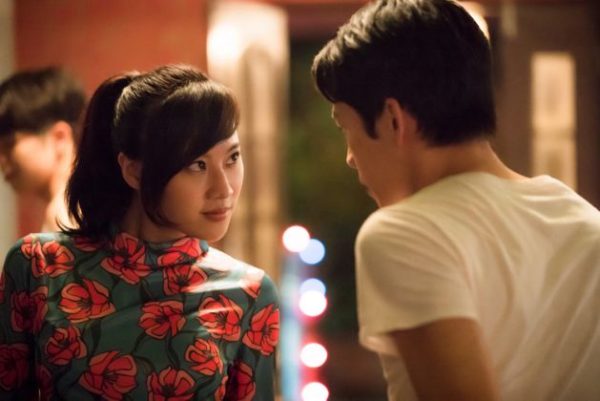I’m a bit late getting to this, but I did watch ‘Tigertail‘ when it premiered on Netflix on April 10th. Tigertail was written, produced and directed by Alan Yang (most known for his work on Netflix’s ‘Master of None.’). The film is about:
“A Taiwanese factory worker leaves his homeland to seek opportunity in America, where he struggles to find connection while balancing family and newfound responsibilities in this multi-generational drama from writer-director Alan Yang.”
A more detailed synopsis of the film and review in Rolling Stone describes ‘Tigertail’:
“Once upon a time, a young man wanted to come to America. He’d grown up in the rural countryside of Taiwan with his grandmother, occasionally having to hide in cupboards from communist Chinese soldiers looking for unregistered citizens. The boy was lonely, except for a girl he met in the fields. His name was Pin-Jui, and her name was Yuan. Later, as a teen, his mother brought him to live with her (his father had long since passed away) and work beside him in a factory in the city. At night, Pin-Jui and Yuan dance to ’60s beat pop at a local bar and dine-and-dash at expensive restaurants. Their friendship is blossoming into a romance. But an opportunity to move to the U.S. beckons, so Pin-Jui leaves his mother, and his job, and his true love behind. He has a new life, a new wife and a humble New York apartment. Decades later, he’ll have a family, including an adult daughter who he doesn’t know how to talk to, and an old man’s memories and regrets. Many, many regrets.”
As a Taiwanese American, there was a lot I could relate to this film and in some ways, see how my parents’ journey to the United States reflected in this story. Much of the film is in Taiwanese (which I don’t understand but can recognize) and Mandarin, subtitled in English as a lot of the film have flashbacks to the past in Taiwan.
For Alan Yang’s directorial debut, Tigertail is a remarkable, but far from perfect, film. The scenes in Taiwan are gorgeous and every rice field scene reminds me of my first time visiting Taiwan in the early 1980s or whenever I am in Taiwan whizzing by the countryside on Taiwan’s elevated High Speed Rail (HSR) getting from one major city to another.
I say a remarkable film to express what Yang himself has expressed in such interviews:
“Tigertail is a progression of Hollywood’s new willingness to tell stories about the Asian American experience. It was only around five years ago that Yang developed a television pilot about a white father and son because he was afraid Asian faces would never get made. Now he says white guys are sending him scripts with Asian protagonists because they believe it could sell better. “You know how crazy that is? That is so crazy.”
As a self-proclaimed optimist, Yang believes Asian American representation is just in its infancy. “We’re not competing against yesterday’s market price in my opinion. We are talking about the entire history of films and entertainment,” he says. “In that world, certainly Asian Americans still have a long way to go.””
Veteran actor Tzi Ma does a terrific job playing the stoic Pin-Jui in contemporary time who is full of regrets and emotionally distant from his daughter. I absolutely loved Lee Hong-chi’s portrayal of the young adult Pin-Jui who is full of energy, optimism and love of life and in love with Yuan, portrated equally as well by actress Yo-Hsing Fang.
The cinemtaography is wonderfully lush and vibrant, especially those scenes that take on the past in Taiwan (especially the local bar scene when Pin-Jui and Yuan were in love, which was definitely inspired by Wong Kar-wai) and contrasted with a more clinical look in the present.
If you want to learn more about the film, this is a wonderful podcast interview with Alan Yang I highly recommend you listen to:
The issues I had with the film were some of the underlying story elements and unanswered questions. Spoilers ahead!
- Why did the factory owner want to setup his daughter with Pin-Jui? The factory owner could have found a richer, more well educated man for his daughter
- Why did Pin-Jui think he could have a better life in the U.S. when he was uneducated and not, as far as we know, not able to speak English at the time?
- Who did Yuan eventually marry? Did she have any kids? How did she come to America?
- The ending – with Pin-Jui visiting his home where he grew up in Taiwan with his daughter – it was =unsatisyfing and made little sense to me at the time. Here’s an explanation. Maybe a bit too subtle for me to pick up.
But overall, I enjoyed the film. For a first time director, it is quite a remarkable film. And the fact that this film could even be made and this kind of story be told is pretty amazing. Streaming platforms like Netflix really provide a whole array of new stories to be told, and we’re all the better for it.










